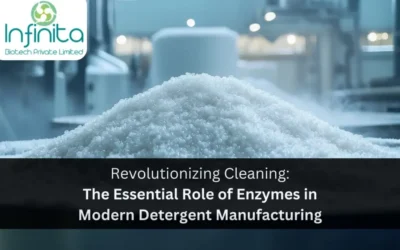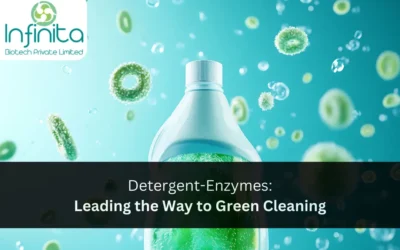Detergent enzymes have revolutionized the cleaning industry, providing a powerful and efficient way to break down dirt and grime. Understanding the science behind these enzymes is crucial in appreciating their effectiveness and potential for future developments. In this article, we will explore the role of detergent enzymes, their chemistry, the process of stain removal, the benefits of enzyme-based detergents, and the exciting advancements on the horizon.
Understanding Detergent Enzymes
Detergent enzymes are biological molecules that act as catalysts in the breakdown of tough stains and dirt. These enzymes are naturally occurring proteins that speed up chemical reactions without being consumed in the process. By targeting specific molecules found in stains, they enhance the cleaning power of detergents.
What are Detergent Enzymes?
Detergent enzymes are specialized proteins produced by living organisms, such as bacteria and fungi. These enzymes possess unique shapes and structures that enable them to interact with specific target molecules. Different types of detergent enzymes have varying functions, allowing for targeted stain removal.
One fascinating aspect of detergent enzymes is their ability to work in a wide range of environmental conditions. For example, some enzymes are effective in both high and low temperatures, making them versatile for use in various laundry settings. Additionally, these enzymes are biodegradable, making them environmentally friendly compared to harsh chemical cleaners.
The Role of Enzymes in Cleaning Products
Enzymes play a crucial role in cleaning products by breaking down complex stains into smaller, more manageable compounds. They do this by catalyzing chemical reactions that would otherwise occur slowly or not at all. The use of enzymes in detergents enhances the overall cleaning performance.
Moreover, enzymes in detergents are highly specific in their actions, targeting only the molecules present in stains without affecting the surrounding fabric. This specificity helps prevent damage to clothing fibers while effectively removing dirt and grime. As a result, detergent enzymes are not only efficient but also gentle on fabrics, prolonging the lifespan of garments.
The Chemistry of Detergent Enzymes
The effectiveness of detergent enzymes lies in their intricate chemical properties and mechanisms of action. Understanding the chemistry behind these enzymes is essential in designing more efficient cleaning products.
Enzymes are biological catalysts that speed up chemical reactions without being consumed in the process. In the case of detergent enzymes, they play a crucial role in breaking down complex stains into smaller, more manageable components. This breakdown process is highly specific, as each enzyme is designed to target a particular type of stain, ensuring maximum efficiency in stain removal.
The Mechanism of Enzyme Action
Detergent enzymes work by binding to specific molecules in stains and facilitating the breakdown of chemical bonds. This process, known as the enzymatic reaction, occurs at the active site of the enzyme. The enzyme undergoes a series of conformational changes, allowing it to convert the stain molecules into simpler forms that can be easily washed away.
Moreover, enzymes are incredibly efficient in their action, often working at lower temperatures than traditional chemical detergents. This not only helps in reducing energy consumption during the washing process but also contributes to a more sustainable approach to cleaning.
Different Types of Enzymes Used in Detergents
Different types of enzymes are used in detergents, and each has its own specific function. Protease enzymes target protein-based stains like grass, blood, and food stains. Lipase enzymes break down fatty substances like grease and oil. Amylase enzymes target starch-based stains, such as those caused by sauces or fruits.
By combining these different enzymes in varying proportions, detergent manufacturers can create products that are tailored to address a wide range of stains effectively. This versatility makes enzyme-based detergents a popular choice for consumers looking for powerful cleaning solutions that are also environmentally friendly.
How Detergent Enzymes Break Down Dirt and Grime
The process of stain removal with detergent enzymes involves a series of steps that effectively eliminate stubborn dirt and grime.
Understanding the intricate process of how detergent enzymes work to break down dirt and grime can provide valuable insights into effective stain removal techniques. Enzymes are biological molecules that act as catalysts, speeding up chemical reactions without being consumed in the process. In the case of detergent enzymes, their specific functions target different types of stains, making them highly effective in removing tough grime from various surfaces.
The Process of Stain Removal
When detergent-containing enzymes are applied to a stain, the enzymes identify and bind to the specific molecules responsible for the stain. The enzymes then break down these molecules into smaller compounds through the catalytic reaction. This breakdown process weakens the stain’s structure, making it easier to be washed away during rinsing.
Furthermore, the enzymatic action not only helps in removing visible stains but also aids in eliminating odor-causing molecules that may be embedded in the fabric. This dual functionality of detergent enzymes ensures a thorough cleaning process, leaving fabrics not only looking clean but also smelling fresh.
Enzymes and Tough Stains
Tough stains, such as those from red wine or chocolate, can be particularly challenging to remove. However, detergent enzymes excel in tackling these stubborn stains. Protease enzymes break down the protein-based components, while lipase enzymes target the grease or oil components. Amylase enzymes, on the other hand, efficiently break down starch-related stains.
By utilizing a combination of enzymes tailored to specific types of stains, modern detergents have become increasingly effective in removing even the most stubborn grime. This targeted enzymatic approach not only enhances the cleaning performance of detergents but also helps in preserving the quality of fabrics by minimizing the need for harsh chemicals or vigorous scrubbing.
The Benefits of Enzyme-Based Detergents
Enzyme-based detergents offer several advantages over traditional cleaning products, making them a popular choice for many consumers.
When it comes to enzyme-based detergents, the benefits extend far beyond just effective cleaning. These innovative products are formulated to target specific types of stains, such as protein-based stains like blood or grass, and break them down at a molecular level. This targeted approach not only ensures thorough stain removal but also helps preserve the fabric fibers, extending the lifespan of your favorite garments.
Efficiency and Effectiveness of Enzyme Detergents
Enzyme-based detergents are highly efficient in stain removal, allowing for cleaner and fresher clothes. The targeted action of enzymes ensures that even stubborn stains are effectively broken down, giving exceptional cleaning results.
Moreover, the use of enzymes in detergents can also help prevent graying and fading of fabrics over time. By effectively removing dirt and grime without the need for harsh chemicals, enzyme-based detergents help maintain the vibrancy and brightness of your clothing, keeping them looking newer for longer.
Environmental Impact of Enzyme Detergents
Another significant benefit of enzyme-based detergents is their reduced environmental impact. These detergents often require lower washing temperatures and shorter washing cycles, resulting in energy savings. Additionally, enzyme-based detergents are usually biodegradable, making them a more eco-friendly choice.
By choosing enzyme-based detergents, consumers can contribute to reducing water and energy consumption during the laundry process, ultimately lowering their carbon footprint. The biodegradable nature of these detergents ensures that they break down into harmless byproducts after use, minimizing their impact on the environment and water systems.
Future Developments in Detergent Enzymes
As technology advances, new developments in detergent enzymes are on the horizon, promising even greater cleaning capabilities and sustainability.
Enzymes have long been recognized for their ability to break down tough stains and odors, making them a key ingredient in modern laundry detergents. However, the quest for innovation in enzyme technology continues as researchers strive to unlock new potentials in this field.
Innovations in Enzyme Technology
Ongoing research into enzyme technology aims to optimize the performance of detergent enzymes. Scientists are exploring ways to engineer enzymes with enhanced stability and activity, ensuring better cleaning results with reduced enzyme usage.
One exciting area of development is the use of bioinformatics and computational modeling to design enzymes with specific properties tailored for different cleaning tasks. By understanding the molecular structure of enzymes at a deeper level, researchers can fine-tune their characteristics for optimal performance in various detergent formulations.
Potential Challenges and Solutions
While the future of detergent enzymes holds great promise, there are challenges that need to be addressed. One challenge is ensuring compatibility with different fabric types. Researchers are actively working on developing enzymes that are gentle yet effective on all types of fabrics to avoid any potential damage.
Another hurdle to overcome is the stability of enzymes in different washing conditions. Enzymes can be sensitive to factors such as pH, temperature, and the presence of other chemicals in the detergent formulation. Finding ways to enhance the resilience of enzymes under varying conditions is crucial for maintaining their effectiveness over time.
In conclusion, detergent enzymes play a vital role in breaking down dirt and grime. Understanding their science and chemistry helps us appreciate their effectiveness in stain removal. Enzyme-based detergents offer numerous benefits, from improved efficiency to reduced environmental impact. With ongoing advancements in enzyme technology, the future of detergent enzymes looks brighter than ever, paving the way for more efficient and sustainable cleaning solutions.







